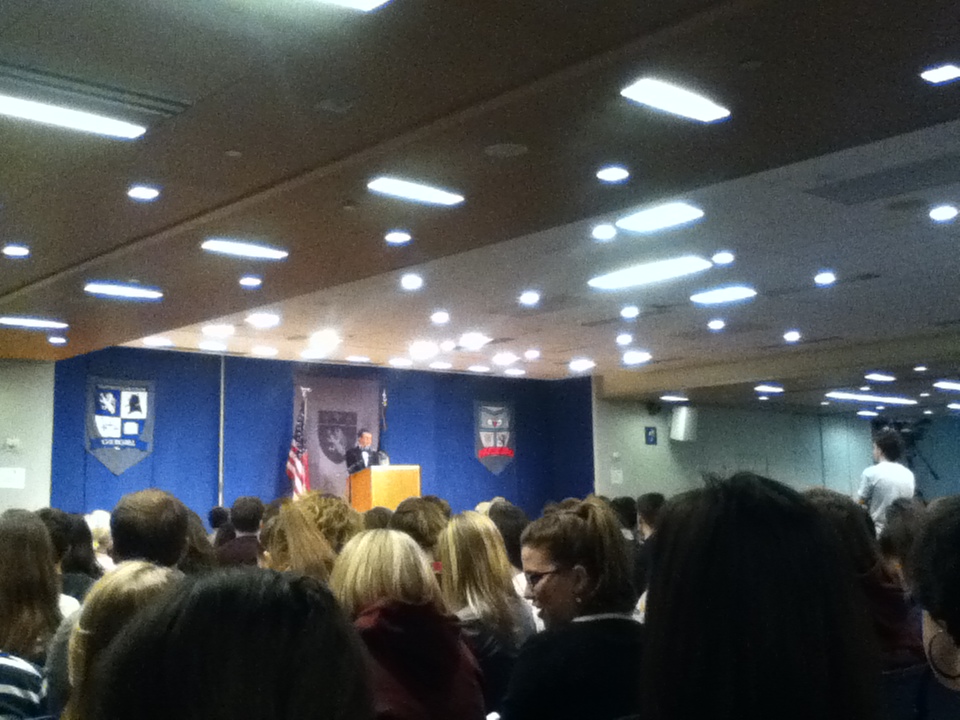Interregnum IX: Churchill wins final debate against Thatcher
Financial District, NEW YORK—The House of Sir Winston Churchill won the final debate against the House of Margaret Thatcher in this year’s Interregnum IX at The King’s College, after making it through five rounds of initial debates and the semifinal debate Friday morning. In Friday afternoon's final debate, Meredith Drukker (’15) and Anna Matthews (’15) of the House of Thatcher debated Noah Heinz (’14) and Josh Craddock (’14) of the House of Churchill. The motion was “This house believes that Dietrich Bonhoeffer was not justified in attempting to assassinate Hitler.”
Drukker opened the debated by arguing that evil leaders will come and go throughout history, but that it is not the duty for Christians to disrespect their earthly authorities by rebelling against them with violent force. While acknowledging that Bonhoeffer had a duty to his country since Germany was being oppressed, she maintained that his first duty was to Christ, who warned against leading others astray. Christ did not teach violence, but rather nonviolent resistance, which makes support of Bonhoeffer’s actions a slippery slope for Christians to take.
Craddock responded that not all rebellion is wrong or prideful. Using Ehud in the book of Judges as an example, Craddock said that violent actions are justified in divinely commanded response to tyranny. He pointed out that Bonhoeffer’s executioner said he’d never seen anyone so devoted to God. Craddock mentioned Rahab as an example of someone who undermined the regime of her nation by allowing spies into it, providing for a just assassination theory.
According to Socrates, we should seek the ultimate good of a thing above lesser, Craddock said. The best way for Bonhoeffer to follow God in this situation was not to obey Hitler’s unjust laws, but to do away with the source of the injustice.
Thatcher rebutted that objectively, God may not have specifically told Bonhoeffer to assassinate Hitler, and humans may never be able to make the judgment between when order is worse than disorder. First, Thatcher said, Bonhoeffer overstepped his bounds, and second, vengeance is the Lord’s, not man’s. The House pointed also to the verse: "Judge not lest you be judged," claiming that Christian duty is simply to love God and be Christ on earth, not to eliminate its evil rulers.
Heinz followed up Thatcher’s rebuttal by saying that while vengeance is the Lord’s, it is often executed through men, and in Christian theology the just war theory enables the carrying out of the Lord’s vengeance. He pointed out that resistance vs. rebellion, breaking one law versus the regime as a whole was one and the same. He said that that shoving an SS officer would have been breaking the law just as forging documents to get across the border--which is what Bonhoeffer did.
Heinz replied that Christians don’t need a specific word from the Lord for their actions to be justified—this is arbitrary judgment. According to just war theory, Heinz said that although peaceful resistance can work, Bonhoeffer was working as an agent of the allies and his actions had a probability of success.
The death of one man (Hitler) weighed against the deaths of 6 million Jews legitimizes Bonhoeffer’s assassination plan as well. Bonhoeffer didn’t want to kill Hitler or take delight in the thought, and Hitler wasn’t even a legitimate governing authority anyway because he used illegal means to gain authority and ruled against the German constitution. As a Christian, it was his duty to strike, not to resist peacefully.
Craddock summed up Churchill’s argument by saying that first of all, Bonhoeffer was acting in his role as a lesser magistrate as a part of the police force, and therefore was upholding the oath of office he took. The rules of engagement, however, change in wartime, and Hitler was not exercising proper authority anyway.
Drukker finished the debate with the point that Christians are subject to different standards. She conceded that Bonhoeffer had political duties and was politically justified in his actions but said that his duties to Christ and the Christian church superseded these political duties. She repeated her earlier examples and points that Bonhoeffer's loyalty was to God, and overthrowing a political regime was not his duty.
Following the final Interregnum event, a lecture given by Dr. John Fleming, the result of the debate was announced: a win for the House of Churchill, who went on to claim this year's House Cup. Congratulations to all for another year of great competition.


